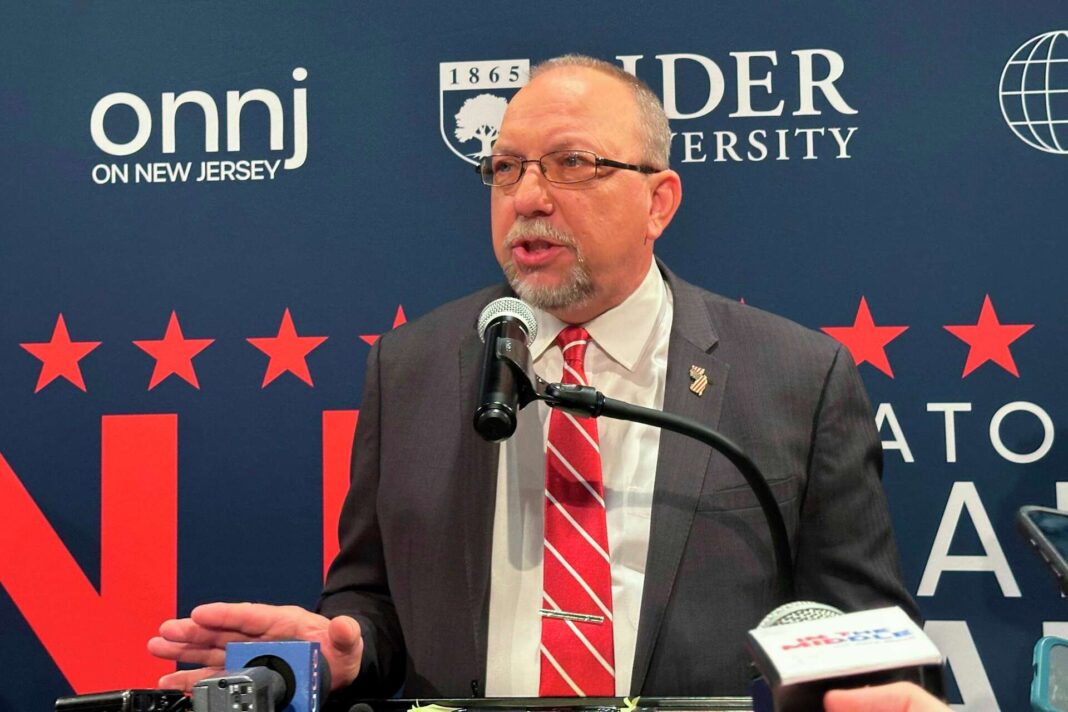In their first debate on Tuesday night at Rider University, Republican candidates for governor in New Jersey clashed over loyalty to President Trump and a variety of other issues, setting the stage for a contentious primary.
From the outset, the candidates engaged in fierce exchanges, driven by the opportunity to reclaim power in New Jersey after two terms under Democratic leadership. Recent election trends indicate a slow shift toward the right in the traditionally Democratic state, as evidenced by President Donald Trump’s gains in the state during the last election, despite it remaining a blue state. Two of the candidates focused heavily on their allegiance to Trump.
Former Assembly member Jack Ciattarelli, who narrowly lost to Democratic Gov. Phil Murphy four years ago, is running for governor for the third time. He faced off against former conservative radio host Bill Spadea, State Sen. Jon Bramnick, and former State Sen. Ed Durr, who refers to himself as “Ed the trucker.”
Several other candidates are also vying for the Republican nomination but have yet to demonstrate a clear path to victory.
Here are some highlights from Tuesday night’s debate, hosted by New Jersey Globe, On New Jersey, and Rider University:
A Different Tone from Democrats
The GOP debate took on a markedly different tone compared to the Democratic debate held the previous Sunday. New Jersey Globe editor David Wildstein, one of the moderators, noted that the atmosphere would not be as congenial, referring to the Democratic debate as “the quiet night.” Moderators struggled to maintain order as candidates frequently interrupted one another, often prioritizing attacks over addressing questions.
Ciattarelli frequently mentioned a website aimed at criticizing Spadea, who in turn mocked Ciattarelli for doing so. Spadea labeled Ciattarelli a “professional politician,” while Ciattarelli countered by calling Spadea a “professional liar.”
Durr suggested that Bramnick’s 2022 vote to confirm Democratic Attorney General Matt Platkin should disqualify him from participating in the debate. In response, Bramnick asserted that Durr lost his Senate seat after one term due to “poor judgment.”
When Durr claimed he was “here for the people, not the establishment like you,” Bramnick shot back, stating, “You weren’t here for the voters — they told you to take a hike.”
While Democrats had made subtle jabs at each other’s voting records on Sunday, the GOP candidates were far more confrontational.
Loyalty to Trump at the Forefront
Ciattarelli and Spadea continually sparred over their allegiance to Trump during the debate.
“In regards to Bill Spadea, when he’s not lying about me or disparaging Donald Trump, he refers to the moderate wing of our party as RINOs [Republicans in name only],” Ciattarelli declared in his opening statement.
The back-and-forth continued throughout the evening, with both candidates accusing each other of previously supporting anti-Trump figures and espousing views contrary to those of the former president.
“At least Jon Bramnick, when he criticizes Trump, is being honest, unlike Jack Ciattarelli, who is a liar,” Spadea stated in his closing remarks.
Bramnick did not shy away from criticizing Trump, but his comments drew boos and murmurs of discontent from the audience when he referenced the January 6th attack on the U.S. Capitol, stating he did not support the president’s mass pardons for rioters, including those who assaulted police officers.
“Either we’re the party of law and order, or we’re not,” Bramnick insisted. “I will stand with police officers every time.”
Divisions Over Referendums, Including Abortion
Bramnick was the only candidate to express support for a referendum on constitutionally protecting abortion rights.
Both Spadea and Durr opposed such a measure, arguing that the state’s abortion access is already excessively permissive. Spadea highlighted his endorsements from the Right to Life organizations and advocated for support of anti-abortion “pregnancy resource centers.”
Ciattarelli stated his support for the right to choose but also endorsed a bill limiting abortion after five months of pregnancy, with exceptions, and advocated for parental notification if a minor undergoes an abortion. He did not clarify whether he supports an abortion referendum.
Bramnick emphasized that referendums and initiatives are crucial for public voices to be heard in a legislature dominated by Democrats.
Ciattarelli specifically mentioned he would back initiatives and referendums on school funding and affordable housing mandates if Republicans do not gain a majority in Trenton.
Spadea argued against initiatives and referendums, claiming they have been “almost always a tool of insiders and elites to siphon more taxpayer dollars.”
Responses to Future Public Health Crises
When asked how they would handle a future epidemic or public health crisis, Bramnick advocated for consulting infectious disease experts and scientists instead of relying on “somebody on the internet.” However, he also criticized Murphy for extending the COVID-19 state of emergency without public or legislative input.
“When declaring a state of emergency, public input is essential,” Bramnick said. “That was a significant failure.”
Ciattarelli expressed his intention to balance public safety with keeping the economy open, identifying as a “live-and-let-live guy” regarding mask-wearing and vaccinations.
Spadea took a more aggressive anti-vaccine stance, asserting he would provide retroactive pay and reinstate those who resisted “the tyranny of masks and forced vaccinations.”
Durr stated he would allow individuals to decide what is best for themselves.
Criticism of the Freedom to Read Act
Bramnick faced backlash from the other candidates for voting in favor of the Freedom to Read Act, which mandates school boards and public libraries to establish policies for library materials to prevent arbitrary book bans while allowing censorship only for materials deemed developmentally inappropriate, rather than based on the author’s views. He was the only Republican senator to support the law.
“Before this, we had the wild, wild West,” Bramnick remarked. “There were no rules whatsoever.”
Durr accused the bill of permitting librarians to “provide pornography to children,” while Bramnick urged him to read the legislation thoroughly rather than just its title.
Ciattarelli argued that only police officers should have legal immunity, and Spadea stated he would have vetoed the bill as governor, standing up for parents who feel their children are exposed to inappropriate material.


